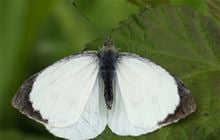DOC wins Supreme Biosecurity Award for pest butterfly eradication
Archived content: This media release was accurate on the date of publication.
Introduction
DOC has won the Supreme New Zealand Biosecurity Award for the world-leading eradication of the pest great white butterfly.Date: 03 August 2017
Our Deputy Director-General Operations Mike Slater says it is an honour to receive the Supreme New Zealand Biosecurity Award for the world-leading eradication of the pest great white butterfly.
DOC was last night presented with the Supreme and Government Awards in the New Zealand Biosecurity Awards that recognise and celebrate contributions by people and organisations to New Zealand’s biosecurity.
Mike Slater says the awards are a tribute to the skills, innovation and determination of the DOC staff and others involved in the eradication of the great white butterfly from New Zealand.
“This was the first eradication of an unwanted butterfly population in the world and it prevented the great white butterfly becoming a major pest in New Zealand.
“We led a multi-agency programme over three and a half years to eradicate the butterfly from the Nelson Tasman region where it was first found in 2010.
“Our rangers carried out more than 263,000 searches of more than 29,000 properties to find and remove the butterfly and its eggs, caterpillars and pupae. The programme ended last year after no sign of the pest for 18 months.
“The Ministry for Primary Industries worked with us and expert advice and research were vital to achieving success.
“We appreciated the support of Horticulture New Zealand and Plant and Food Research which provided funding and research assistance and AgResearch for research support funded through the Better Border Biosecurity research collaboration.
“We are also very grateful for the crucial support of the people of Nelson Tasman.”
The great white butterfly is a destructive pest of brassica plants in numerous countries across Europe and western Asia. Its caterpillars feed voraciously in groups on host plants, rapidly reducing them to a skeleton.
The butterfly would have spread throughout New Zealand if not stopped. It posed a serious threat to 79 native cress species, especially 57 at risk of extinction, and it would have ravaged commercial vegetable crops and farm forage crops.
An independent assessment for DOC estimated that if the butterfly became widespread it could cost the country $43 million to $133 million a year in spraying crops and protecting native cresses.

Left-right: Mike Slater, Martyn Dunne, Director-General of the Ministry for Primary Industries, John Hellström, Chair of the Selection Board for the Awards, Gina Solomon, Nelson Marlborough Conservation Board Deputy-Chairperson, Roy Grose, Lou Sanson, Director-General of the Department of Conservation, and Nathan Guy, Minister for Primary Industries
Image: Hayley Benoit, Ministry for Primary Industries
More information
Media release from Minister of Primary Industries Nathan Guy.
New Zealand Biosecurity Awards
Contact
For media enquiries contact:
Email: media@doc.govt.nz

